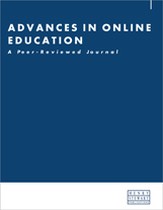Nature-based extended reality for inclusive learning in environmental design
Abstract
As inclusive learning gains importance in higher education, can online education help make the virtual experience of nature and design in nature available to all? Too often, outdoor experiences such as field trips require resources beyond the reach of some students. But through the use of virtual reality headsets and related technologies, extended reality (XR) can create virtual nature-based educational experiences for all students. This is particularly important in environmental education, which centres on design for and understanding of natural environments. This paper proposes innovative online learning strategies and technologies in nature-based extended reality (NXR) courses for inclusive learning in environmental design. It describes the author’s planning of a NXR graduate architectural design course. It also offers a framework for structuring the ideas, activities and resources required to offer such NXR courses in an environmental design curriculum. A pilot NXR course has taken place in autumn 2022. Later publications will discuss the results of this experiment and evaluate its success. The pilot course is a graduate seminar in the author’s College of Design that has been taught for eight semesters. The pilot course can provide valuable lessons transferable to all of the design studio courses that form the backbone of a learner’s educational experience in the college. The pilot project is intended to create interactive, immersive, virtual experiences to all students on the course. NXR will allow the students to not only visit the site of a building design project and interact with design clients virtually, but also enable the students to design the project collaboratively in a virtual reality environment. This can be achieved without requiring students to buy or rent expensive equipment. More importantly, NXR learning makes these experiences available to all students regardless of ability and resources.
The full article is available to subscribers to this journal (subscription is free).
Author's Biography
George Elvin PhD, LEED AP, is an Associate Professor of architecture at North Carolina State University, where his research and teaching focus on architecture for extreme environments. He is the author of over 40 books, chapters and articles, and has delivered lectures and workshops in over 20 countries. In 1981 he founded his own design-build company, and in 1998 received his PhD in architecture from the University of California at Berkeley. He has taught at the University of California at Berkeley and the University of Illinois at Urbana-Champaign. He has been a Fellow at the Center for Energy Research, Education and Service, the Scholarship of Teaching and Learning Institute, and the University of Edinburgh’s Institute for Advanced Studies in the Humanities.
Citation
Elvin, George (2023, January 1). Nature-based extended reality for inclusive learning in environmental design. In the Advances in Online Education: A Peer-Reviewed Journal, Volume 1, Issue 2. https://doi.org/10.69554/MXLD8984.Publications LLP
